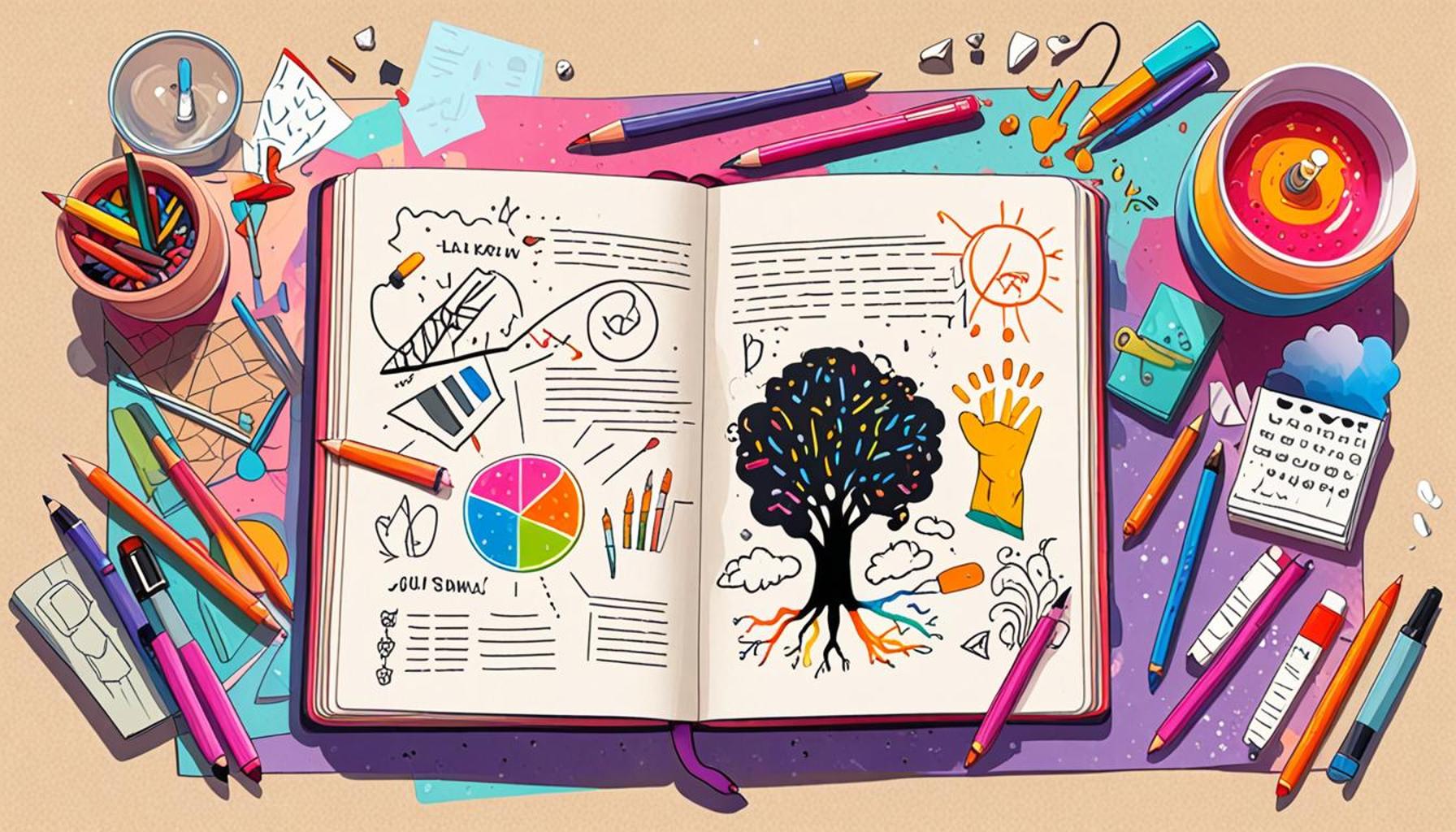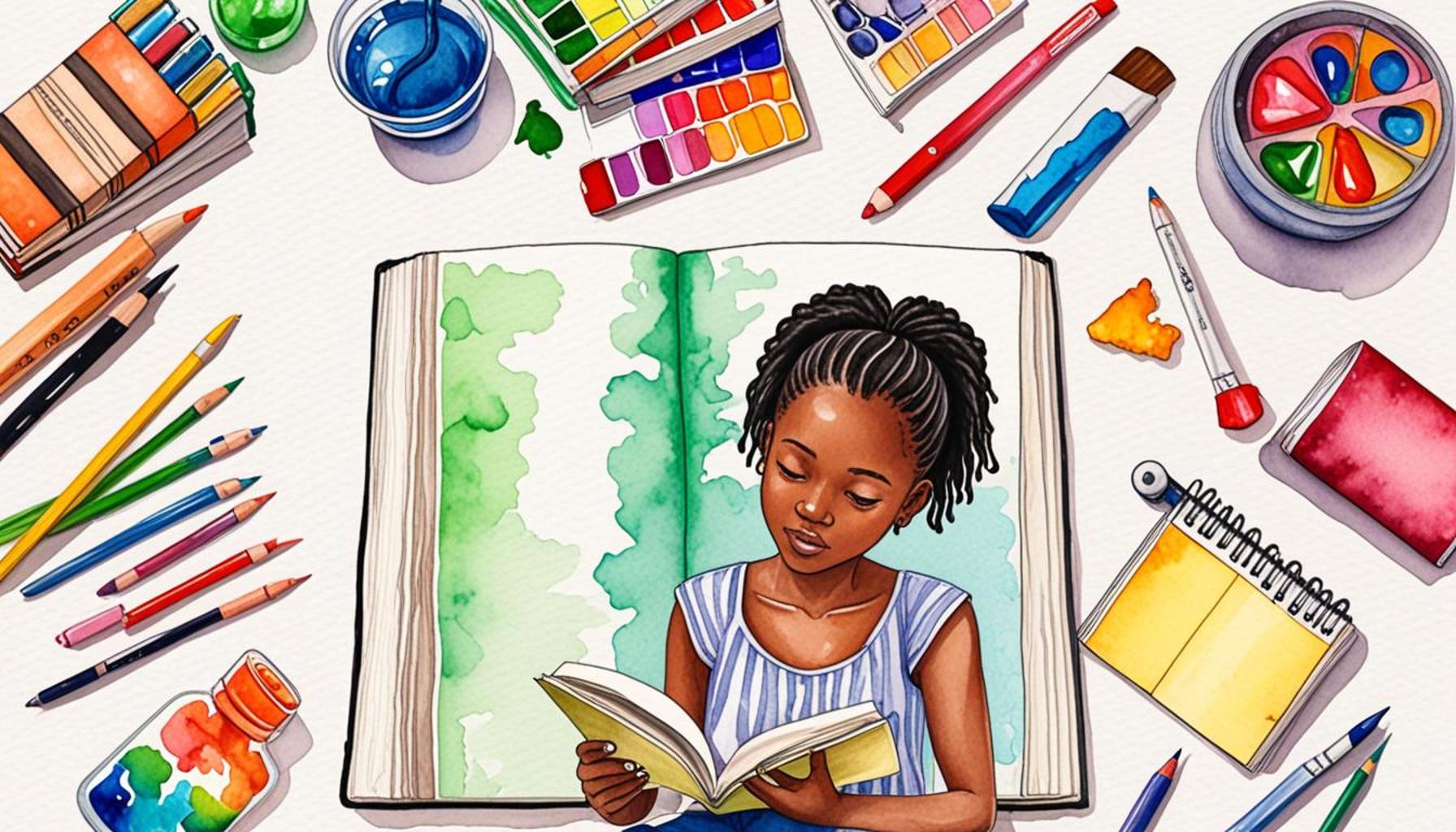Strategies for Integrating Reflective Journaling into Daily Learning Practice

Exploring the Benefits and Implementation of Reflective Journaling
The practice of reflective journaling offers a transformative approach to learning that can significantly enrich personal and academic development. By encouraging individuals to document and analyze their experiences, reflective journaling extends beyond simply recording events—it becomes a powerful tool for self-discovery and growth.
One of the primary benefits of incorporating reflective journaling into educational practices is the boost in self-awareness. Journals serve as a canvas for learners to express their thoughts and emotions, providing a structured space to evaluate their actions and motivations. This process often illuminates personal strengths, as well as areas that may require further development. For instance, a student who consistently notes their struggles with subjects like mathematics may discover patterns in their learning habits or seek additional resources to improve their skills.
Moreover, reflective journaling fosters critical thinking by urging students to engage with their learning on a deeper level. As they reflect on assignments, projects, or group discussions, learners develop the analytical skills necessary to assess their experiences critically. This not only enhances their understanding of subject matter but also equips them with problem-solving abilities that are essential in both academic and real-world settings. For example, after reflecting on a failed group project, students can identify communication breakdowns that hindered success and strategize more effectively for future collaborations.
Another important aspect of journaling is its role in emotional regulation. Particularly for students dealing with academic pressures or life challenges, writing can provide a constructive outlet for processing feelings. The act of externalizing emotions can diminish stress and facilitate mental clarity. A student overwhelmed by exam preparation might spend a few minutes journaling their worries, transforming anxiety into actionable insights about their study habits.
Implementing Reflective Journaling in Nigeria
In Nigeria, where education is influenced by a myriad of cultural and societal factors, the integration of reflective journaling can be particularly meaningful. Tailoring journal prompts to reflect local contexts and values can significantly enhance student engagement. Discussions might include one’s experiences with communal gatherings or reflections on the importance of education within one’s family, making the practice not just a personal exploration but a cultural connection.

Furthermore, fostering group collaboration through shared journal entries can build a sense of community among learners. In study groups, students can exchange insights from their reflections, supporting one another in identifying solutions to common challenges. This collaborative environment promotes not only individual learning but also collective growth, reinforcing the importance of teamwork in academic settings.
Finally, embracing digital tools can further enhance the journaling experience, particularly among Nigeria’s tech-savvy youth. Utilizing mobile apps simplifies the process of journaling, making it more accessible and engaging. Students can easily document their thoughts in multimedia formats such as voice notes or video reflections, incorporating technology into their educational journey.
By adopting these strategies, reflective journaling not only enriches the learning experience in Nigeria but also nurtures vital life skills, paving the way for both personal fulfillment and academic success. This holistic approach empowers students to become more mindful and adept individuals, ready to navigate the complexities of life with greater resilience and insight.
LEARN MORE: This related article may interest you
Practical Approaches to Engaging with Reflective Journaling
Integrating reflective journaling into daily learning practices requires thoughtful strategies that not only encourage consistency but also enhance the overall learning experience. As educators and learners embark on this journey, several effective approaches can be adopted to ensure that journaling becomes a significant part of the educational culture.
One of the first strategies is to set clear intentions for journaling. Students should understand the purpose behind reflective journaling—whether it’s to analyze their learning experiences, document personal growth, or explore academic challenges. By articulating their goals, learners are more likely to engage meaningfully with their journals. For instance, a student might aim to improve their writing skills, deepening their reflections to analyze their learning evolution more thoroughly.
Another practical step is to incorporate structured prompts into the journaling process. Instead of leaving students to decide what to write, educators can provide guided questions tailored to curriculum topics. Examples of reflective prompts that can resonate with Nigerian learners include:
- What challenges did you face during this week’s study, and how did you overcome them?
- Describe a moment in class where you felt inspired or especially engaged; what sparked that interest?
- How can the lessons learned this week contribute to your personal or career aspirations in Nigeria?
These prompts not only help students focus but also connect their academic experiences with personal relevance, enhancing reflection quality. Furthermore, allowing students to suggest their own prompts can encourage ownership over the journaling process, leading to richer insights.
To maintain momentum, it’s vital to cultivate a habit of regular journaling. Integrating dedicated journaling time into the academic schedule—perhaps at the closing of each lesson or at the start of the week—can reinforce this discipline. Educators might consider designating a few minutes at the beginning of class for students to jot down thoughts from previous lessons, ensuring that reflection becomes part of their routine. This consistent practice turns reflective journaling into a habit rather than a sporadic task.
In addition to individual reflections, incorporating peer sharing sessions can enhance the journaling experience. Scheduled opportunities for students to share insights from their journals can foster a supportive community where learners feel comfortable discussing their thoughts and findings. These sessions can take various forms, from small group discussions to class-wide sharing, providing a platform for collaborative learning. Educators in Nigeria may facilitate these sessions with culturally relevant contexts—encouraging exploration of communal themes and values in reflections that resonate deeply with student experiences.
Lastly, embracing technology can modernize the reflective journaling practice. Given Nigeria’s increasing access to smartphones and the internet, students can leverage apps and digital platforms to document their reflections easily. These tools often provide multimedia options, allowing learners to combine text, images, and voice notes, making the journaling process more engaging and versatile.
By implementing these practical strategies, educators can seamlessly weave reflective journaling into daily learning practices, creating a nurturing environment that fosters self-awareness, critical thinking, and communal growth among Nigerian students. As this integration develops, the long-term benefits will be significant, shaping learners into reflective practitioners who are prepared for both academic pursuits and the challenges of life.
Strategies for Integrating Reflective Journaling into Daily Learning Practice
Reflective journaling serves as a powerful tool in personal and academic growth, allowing individuals to critically assess their learning experiences and insights. To effectively incorporate this practice into daily routines, a systematic approach can help maximize its benefits. Here are a few proven strategies worth exploring.Firstly, designate a specific time each day for journaling. Whether it’s during morning coffee or before bedtime, consistency encourages habit formation. This dedicated time fosters a space for deeper reflection, ensuring that thoughts are adequately processed rather than rushed.Next, employ prompts to guide entries. Instead of writing aimlessly, prompts can focus thoughts and steer discussion. Prompts like “What did I learn today?” or “How did I overcome a challenge?” can ignite meaningful dialogue with oneself, enhancing the reflective process.Additionally, consider integrating different media formats into journaling practices. Beyond traditional writing, introducing visuals like drawings, diagrams, or even photographs can enrich the journaling experience. This multi-faceted approach caters to varied learning styles and stimulates creativity.Moreover, it is vital to share reflections with peers or mentors occasionally. This act not only fosters accountability but also encourages constructive feedback. Engaging in dialogues around your reflections can open new avenues for understanding and improvement.Finally, embracing a growth mindset is essential when journaling. This perspective aids in recognizing that every experience, positive or negative, contributes to personal growth. With this mindset, journaling transforms from a mere task into a meaningful avenue for self-discovery.Each of these strategies lays the groundwork for a more profound engagement with reflective journaling, helping learners unlock their full potential while deepening their educational journeys. With practice, reflective journaling can evolve from a routine task into an enlightening habit.
| Category | Benefits |
|---|---|
| Consistent Timing | Encourages habit formation and deep focus. |
| Prompt Usage | Guides effective reflection and critical thinking. |
| Diverse Formats | Enhances creativity and addresses varied learning styles. |
| Peer Sharing | Encourages feedback and collective learning. |
| Growth Mindset | Transforms challenges into opportunities for growth. |
RECOMMENDED: Check out this similar article
Fostering a Culture of Reflection in Learning Spaces
To maximize the benefits of reflective journaling, it’s essential to cultivate a supportive culture of reflection within learning environments. This culture can significantly enhance how students perceive and engage with their journaling practice. One effective strategy is to introduce reflection workshops, where educators guide students on the art of reflection and journaling techniques. These workshops can include interactive sessions that demonstrate how to articulate thoughts, feelings, and learning experiences meaningfully. By training students on effective journaling methods, they gain both confidence and skills that enrich their reflective practices.
Additionally, creating a safe space for vulnerability is crucial. Students often hesitate to express their true reflections due to fear of judgment. By promoting a non-judgmental environment, educators can encourage authentic sharing. This can be achieved by establishing ground rules for discussions related to journaling, ensuring students understand that the focus is on personal learning rather than academic performance. To illustrate this, educators might share their own reflections or experiences, making the process more relatable and establishing a sense of community.
Empirical research has shown that incorporating multimodal journaling can also enhance engagement. This approach gives students the flexibility to express themselves beyond traditional writing. In the context of Nigeria, learners might engage in creative journaling by integrating photographs from their daily lives, drawings reflecting cultural expressions, or audio recordings of their thoughts. This not only caters to diverse learning preferences but also allows for a richer representation of students’ experiences, fostering deeper connections between their reflections and their realities.
An essential component of effective reflective journaling is feedback and iteration. Regularly providing constructive feedback can significantly enhance the reflective process. Educators should establish a routine for providing feedback on student journals, focusing not just on content but also on the depth of reflection. Implementing routines, such as end-of-term reflections where students revisit their previous entries and respond to guiding questions like, “What have you learned about yourself?” can help create an environment where learning and growth are ongoing. This iterative process encourages students to reflect on their journey over time, illustrating progress and areas for improvement.
Moreover, integrating real-world applications into reflective journaling can make learning more relevant. Educators can encourage students to connect classroom knowledge with practical experiences. For example, students could document their reflections on local community projects or internships and analyze how these experiences tie into their academic learnings. This not only enhances the depth of their reflections but also underscores the real-life significance of their education. In Nigeria, where local industries and social issues provide ample learning opportunities, connecting journaling to practical experiences can be particularly empowering.
Finally, celebrating achievements and insights is vital for sustaining enthusiasm for reflective journaling. Educators might recognize students who demonstrate exceptional reflective practices by sharing excerpts from their journals publicly or featuring them in class newsletters. Celebrating these moments can incentivize students to engage more deeply with their reflections, making journaling an even more integral part of their learning journey. By acknowledging achievements, educators not only validate student efforts but also provide motivation for continued commitment to reflective practices.
By employing these innovative strategies, educators can enhance the integration of reflective journaling into daily learning practices, fostering a rich, engaging environment where students feel empowered to reflect and grow through their educational journeys.
SEE ALSO: Click here to read another article
Conclusion: Embracing the Power of Reflective Journaling
In today’s fast-paced educational landscape, integrating reflective journaling into daily learning practices offers students a unique opportunity for self-discovery and growth. As explored in this article, strategies such as cultivating a culture of reflection, providing multimodal journaling options, and fostering a safe space for authentic sharing are all pivotal in enhancing the journaling experience. These approaches not only deepen engagement but also promote critical thinking, resilience, and personal development.
Moreover, by incorporating real-world applications and emphasizing the importance of feedback and iteration, educators can help students contextualize their learning within the broader fabric of their lives. This connection to practical experiences is particularly relevant in Nigeria, where local communities and cultures offer a rich tapestry for reflection. Recognizing and celebrating students’ achievements and insights further fuels their motivation, ensuring that reflective journaling becomes not just a task, but a transformative journey.
Ultimately, as we embrace these strategies, we pave the way for a more engaging, responsive, and meaningful educational experience. By prioritizing reflective journaling in daily practices, educators equip students with the tools they need for lifelong learning and self-awareness, encouraging them to look inward and articulate their unique perspectives in an ever-evolving world. The potential for growth is limitless, and the journey of reflection is just beginning.


